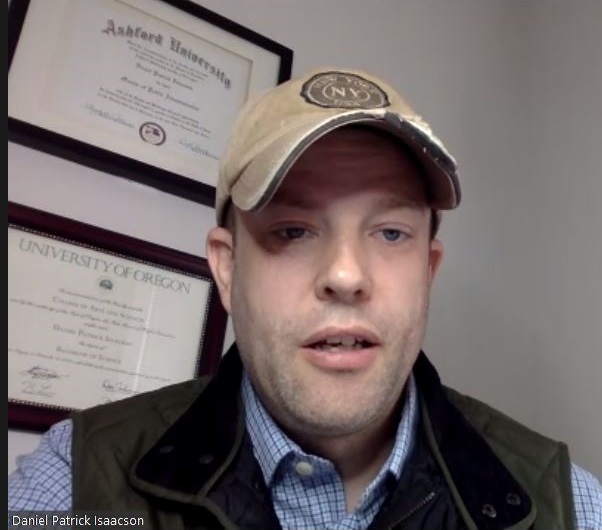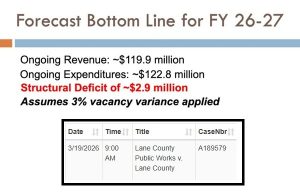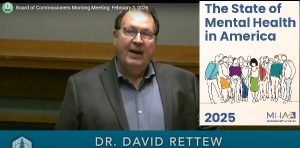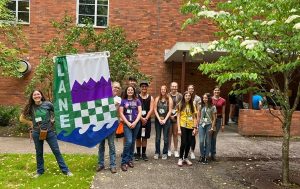Dan Isaacson talks public engagement, One Gro, Ward 7
9 min read
Dan Isaacson is among the leading candidates to replace recalled City Councilor Claire Syrett. He is currently chair of the city’s official Citizen Involvement Committee, our local experts on public engagement. So we asked him:
- What would it take for citizens to be heard on the River Road EmX?
- As spokesman for a campaign that sued voters and called them “dupes,” and participant in a 2017 campaign that Creswell voters called intimidation, we wanted to know how he will represent all the residents of Ward 7.
- And after his business spectacularly imploded, leaving him millions of dollars in debt, we also had to ask: Why should he be chosen as a decision-maker, casting votes on behalf of city taxpayers?
[00:00:42] Dan Isaacson: When I came onto the Planning Commission, the standard practice that was told to me was: ‘You’re going to get emails. Sometimes you’ll go an entire two months without getting an email, sometimes you’ll get 50 in a day. Read them, file them however you want to file them, but that’s pretty much the extent of how we interact with folks.’
[00:01:02] That’s not how I interact with folks. I have called, written, or emailed every single person who has ever written to me or the Planning Commission. Every single one. During HB 2001, I spent hours on the phone calling people. Most of the time (they) were people who did not agree with me. So when I called them, it wasn’t to challenge them or debate them or tell them that they were wrong. It had nothing to do with any of that. In fact, it was the exact opposite. It was: ‘Tell me what your perception of HB 2001 is. What are your concerns? What are your fears? I will say what I know about it and see if there’s any sort of common bond. I’ll say what the line of thinking I’m coming up with was, and why I’m thinking the way I’m thinking.’
[00:01:47] If somebody’s taking the time to find our email, draft out a response, and send it in, they are due back a response. That’s the most basic level of governance that we have an obligation to do. It shouldn’t be a form letter. It shouldn’t be a: ‘Thanks for writing me, you’ll never hear from me again.’ It should be, ‘Hi, I’ve read your email, or here’s a telephone call. Thank you for calling. Let’s talk about this a little bit.’
And who taught me that was (U.S.) Sen. (Ron) Wyden, when I worked in his office. That is the one thing he instilled in every single one of us. Every person who writes, every person who calls gets some communication back from us. It just never goes unanswered. And there’s no such thing as a form letter, you know? And he’s committed to what, 1,000 town halls so far?
We have not done a good enough job, a better job, at showing people that they have been heard. And I’ve tried within my world to do that as best that as can as a volunteer planning commissioner by emailing and calling folks.
[00:02:51] So when you relate that back to EmX, they dropped off those 400 signatures, and your question of: ‘If you were a city councilor, what would’ve happened?’ What would have happened was, hopefully, I would’ve asked them immediately to say, ‘Can you give me the people who were in Ward 7?’ ‘Cause right now it was just a mishmash of signatures with—some had names, some didn’t have names or addresses, all over, there was just a data dump. Here’s a bunch, here’s a phone book and an assignment for some homework for you.
[00:03:19] Part of the problem is that you don’t pay the city council. So I don’t have a staff, so I have to fit that into somewhere in my time to be able to get this for you. So, you know, let’s put that on the table.
[00:03:28] But I would start calling people and say, ‘Here’s my understanding. Let’s talk about what your understanding is. Let’s see where we’re at with things. And I think that even if you just did that, it would’ve taken down the temperature, I think a pretty good degree.’
[00:03:44] I commit to having office hours every week in Ward 7, in rotating fashion going from Santa Clara, River Road, the Whit. So people would have been able to say, ‘Hey, I wasn’t able to drop off my petition, but I came down to the donut shop or to wherever, you know, Slice Pizza or wherever it is, and I want to tell you about my feelings on EmX.’ That’s what—that would’ve happened.
[00:04:07] And I’ll be out knocking on doors every single weekend, so that people would’ve told me at the door, ‘Hey, I don’t like this at all.’ I heard it, I heard a mouthful, earfuls of it when I knocked on doors already.
[00:04:17] So again, if you’re doing the fundamentals, this (recall), it still can happen, but it is less likely to be at the fervor that it was, and I can’t correct all of council. I can’t force other councilors to do things. Again, you don’t pay council a wage that would allow some folks to be able to do this. I can, and I’m willing to do it, and that’s fine.
[00:04:38] If it sets a new standard, great. If it doesn’t set a new standard, great. But in terms of Ward 7 representation, we are the most diverse ward in the city, hands down. The folks in Whiteaker could not possibly be more diametrically opposed to just about everything you could think of, to the folks in Santa Clara.
[00:04:55] But somebody still has to speak to them and somebody still has to bridge that divide and be able to talk to both sides and say, ‘This is what this person wants, this is what this person wants, this is why it’s beneficial for you to allow them to have that, and this is why it’s beneficial for you not to have this.’ And right now, that’s not happening. So for me, that’s entirely my focus.
[00:05:17] John Q: We sat in a Lane County courtroom with Dan in October, for a hearing related to debts he owes for his company One Gro, and asked for the whole story. It starts like this: At a crossroads in his life, Dan Isaacson took a wrong turn.
[00:05:30] Dan Isaacson: I gave up my life in Chicago to come out based on what essentially turned out to be a lie by our former founder and business partner, who we had to fire.
[00:05:38] The most basic—in a nutshell, I was given $150,000 to move out here and within two weeks realized that we were in deep, deep trouble and I had to loan that company back every dollar.
[00:05:54] It was all because I just believed a lie. And you know, you watch these shows where you see some guy who’s been catfished, you know, he gives his whole life savings to some girl that lives overseas and he’s never met. And you think, how could you possibly be that stupid? You know? I mean, how could you fall for what is clearly not real? I get it. I get it, you know, and it sucks (laughing), but it is what it is.
[00:06:30] The entire industry itself went through a pretty solid retraction in 2018, which is what caused our problems. And you know, there’s no such thing as bankruptcy in cannabis, that’s a federal law.
[00:06:42] If you look at who had control of our company in the very beginning and who was fired immediately afterward, and what it’s been since then, they’re two completely different companies. It doesn’t mean that we’re not shielded from that responsibility.
[00:06:54] We had an option in May of 2018. I sat down with the rest of the people who were here—friends, family, supporters, and people we owed money to—and decided whether or not to pack it in and leave. But in doing so, everyone and everything we’d ever made promises to, we would lose everything. And that wasn’t something that I was willing to do since I raised a good chunk of the money from friends and family, my parents’ retirement, my retirement.
[00:07:19] So it was either stay and work for free and get everybody paid back, or pack it up and leave. We chose the former. And that decision has been the most difficult, painful, traumatic decision of my life.
[00:07:28] When I took over the company in May of 2018, it was almost $8.1 million in debt. $8.1 million. Since then, we have gotten rid of, or paid it down to just a little under $2 (million). So we’ve got $2 million to go.
[00:07:48] If somebody wants to make a—judge my entire character of my entire life based on four months that happened in 2017, that’s their prerogative.
[00:07:59] John Q: One Gro promised to pay for the special election in Creswell, win or lose. Will you honor that pledge?
[00:08:05] Dan Isaacson: So, here’s the thing on Creswell. I am bound by those debtor exams and the other debts that we have, the order by which I can pay people. If I write a check to the City of Creswell, those people would sue the City of Creswell to get that money back. So I can’t pay them yet. The operative word there is ‘yet.’ Everyone, what I made the commitment in May of 2018 was, was that every single person who we owed money to, I would work every day to get that money back.
[00:08:36] And as long as I’m here, that’s what we’re going to do. So if I walk into the City Hall of Creswell in 2027 with a check for $2,000, then that’s what I’ll do.
[00:08:46] John Q: Given his multimillion-dollar debts, would Dan serve any particular industry with his votes and then take a job in that industry, as other appointees have done in Eugene?
[00:08:55] Dan Isaacson: So your question is, am I using this as a springboard to get some sort of a lucrative K Street job, after the fact? No.
[00:09:05] You know, I ran all of Silke Field during the Holiday Farm Fire. I ran the entire evacuation for the Washington Tornado in 2013, which is almost exactly nine years ago. I mean, I’m constantly active in my community. I’ve been active in my community, not since I just got back from Illinois, I’ve been active in my community my entire life.
[00:09:22] My interest is purely two things. One, righting Ward 7 and making sure that the pathway by which people interact with their counselor changes. The average person down the block doesn’t really care about what I believe in, or where I come from, or what I believe on my stances, on my issues. What they care about is the leaves haven’t been picked up, the pothole hasn’t been fixed. The streetlight is out. Right? So they want to connect with the city to try to figure out how to get those things done.
[00:09:52] Santa Clara built all these brand-new houses, right? Beautiful neighborhood—Chardonnay Lane and Korbel Street—and they built them so fast that they didn’t install the infrastructure afterwards. So you have a four-way intersection and there’s no stop sign and there’s no streetlight, so people are careening into each one another and kids can’t cross the crosswalk because of it.
[00:10:11] You’ve got glass in the crosswalks, in the bike lanes on the way down River Road. Trainsong has issues where almost all the houses there were built before 1980, so they’re hugely inefficient. The roads are somewhat maintained, but they have some issues. I mean, just the basics, like the fundamentals, right?
[00:10:28] So again, at the end of the day, if you look at what a City Councilor Isaacson administration would look like, you know, this person is going to be the most scrutinized city councilor in a long time in Eugene. You’re going to be running for this office for the next two years. This person has to immediately run Dec. 13 for the May seat. That person has to turn around in May, and assuming that they don’t get 50%—which there’s going to be probably a lot of people running, so that person’s probably going to go to November—run in November, then turn right around and run the following May for a full term.
[00:11:05] So it’s a pretty good audition and job interview for the Ward 7 residents. If what I’m saying is all BS, and I’m nothing but smoke and mirrors, and all I do is push party-line politics, and you never hear from me or anything that I’m saying, you have about five different chances to boot my tush to the curb.
[00:11:21] John Q: The city council will interview selected candidates in December.







